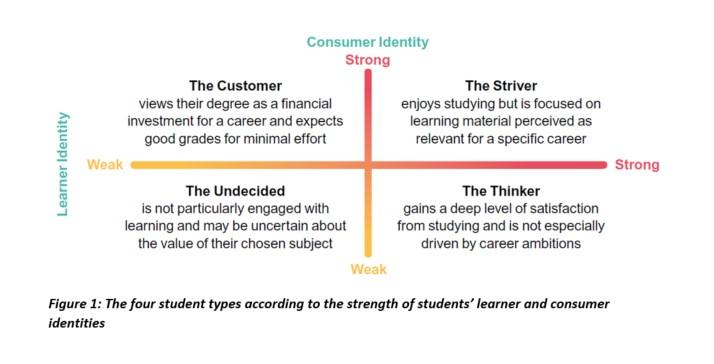Introducing the student identities toolkit
A new toolkit published by Advance HE for its members called 'Balancing students’ identities as learners and consumers', provides a way for educators to support their students to foster successful identities as students within their discipline. The toolkit provides a structure that facilitates a reflective and critical dialogue between educators and their students about the impact of learner and consumer identities on learning and teaching.
Feedback from students who have taken part testifies to its transformative impact:
"It gives me insight into the way I learn, and knowing this may benefit the way I study and approach my work in the future."
"It helps you understand yourself better, your motivations and perhaps even help explain why you do well or not that well in your course."
"It was interesting to realise that there was a correlation between consumers and poor grades. This has made me re-evaluate whether my poorer grades are because I expect to be taught everything I know rather than forcing myself to go out there and do more. So thank you for that."
Implementing the workshop with your students
This workshop would make a valuable induction week activity, or it could be used with students in any year group (UG or PG) as part of study skills or personal tutor group sessions. In the workshop, which takes between 60 - 90 minutes depending on group size, students take part in a number of activities to enable them to assess, discuss, reflect on, and develop their identities as successful members of their discipline.
First, students complete a short profiler quiz to establish the strength of their learner and consumer identities, and discover their student type (see Figure 1). Next, they learn about the research on the impacts of learner and consumers identities on academic outcomes, before taking part in small group discussions with focused questions for reflection and critical debate. Finally, the educator leads a plenary to co-create with students a set of attitudes and behaviours that support learning to create a shared social identity as a student within their discipline. These principles can be returned to throughout the course to facilitate the development of successful student identities that support transformative learning and teaching within your disciplinary context.

Background and research behind the toolkit
Our identities, or how we view our self, describe who we think we are, and they influence our thoughts, feelings, beliefs, and our behaviour. The extent to which a student identifies as a member of their discipline or a ‘learner’ will impact their approach to studying and ultimately their academic outcomes.
The marketisation of higher education in several countries over recent decades has seen the emergence of a new student identity, that of a customer or consumer. This new identity can be characterised by beliefs such as being owed a degree in exchange for tuition fees, thinking that grades are more important than learning, and complaining about difficult content. These types of attitudes create superficial levels of engagement and a poorer student experience: research shows that students who identify more strongly as consumers as opposed to learners have poorer outcomes, lower quality motivation, and less deep approaches to learning (Bunce et al., 2017; King & Bunce, 2020; Bunce & Bennett, 2021). Thus, this toolkit was created as a way to support educators and students to bring these issues to the fore, and to begin to overcome them.
The identity building activities are underpinned by a social-psychological theory of identity (Social Identity Theory). This is because our identities are formed and influenced by the groups to which we belong. An important part of the workshop involves helping students form a cohesive group identity with a shared set of attitudes, beliefs, and behaviours that support learning in their discipline. It is designed to give students both an understanding of identity, and practical ways to optimise their learning to create a meaningful and successful learning experience.
Advance HE members will find all the materials needed to run the workshop in the toolkit.
For more information or advice on implementing the toolkit in your course, please email the author louise.e.taylor@brookes.ac.uk.